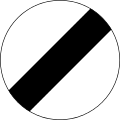Speed limits in New Zealand
Speed limits in New Zealand are in kilometres per hour and range up to and including 100 km/h. New Zealand speed limits were in miles per hour (mph) until 1975, when the country metricated its road signage.
Significant changes were made to the rules for setting speed limits in 2003 and 2011, including provision for 40 km/h limits. However, it was then necessary to introduce the Land Transport (Speed Limits Validation) Bill in 2015 to confirm the legitimacy of the previous changes.[1]
The most commonly seen are:
- 100 km/h, the current open road limit, is used in rural areas and on motorways, expressways and highways, as well as areas where there is little development on the roadside.
- 80 km/h is used where it would not be safe to use the 100 km/h open road limit, such as urban arterial routes or areas requiring extra care (such as Auckland City's Central Motorway Junction, due to its complexity). Between metrication in 1975 and 1986, 80 km/h was the open road limit.[2]
- 70 km/h in small country towns, urban fringes (often preceding a change from the open limit to urban limit), or where development is on only one side of the road
- 60 km/h in some built-up areas including arterial routes.
- 50 km/h in most urban or built-up areas; LSZ (see below) under adverse conditions
- 40 km/h The Land Transport Rule: Setting of Speed Limits 2003 allowed councils to set limits below 50 km/h in urban areas.[3] Since then many councils have set lower limits. For example, Safer Speed Areas were first introduced in Hamilton in 2011 and by 2014 there were 36 of them.[4]
- 30 km/h through most roadworks.
- 20 km/h traffic travelling both ways past school buses that have stopped to unload or pick up passengers; and through accident sites.
Some vehicles are restricted to lower overall speed limits such as trucks and vehicles with trailers (90 km/h), and school buses displaying signs (80 km/h).
The letters LSZ (Limited Speed Zone) indicate that the limit is 100 km/h unless conditions (visibility, road condition, rain, many other road users) would make this unwise, in which case it is 50 km/h. This type of speed limit could no longer be set since 2003 and was progressively being replaced with set speed limits. From 1 July 2009 the sign is now illegal.
Although there is no minimum posted speed limit. It is illegal to drive at an "unreasonably slow speed" which means slow drivers are required by law to pull over to the side of the road to allow queues of cars behind them to pass. The police can and do enforce this law in which the offending driver is given anything from an $NZ150 infringement notice for Inconsiderate Driving to possibly an indictment for Careless Driving which is usually dealt with by the Courts.
Signage
New Zealand speed limit signs follow the European model of a number inside a red circle. Sometimes, the open road limit occurs as a black forward slash inside a thin black ring (similar to the UK's National Speed Limit sign).
.svg.png) (RG-1) 10 km/h speed limit
(RG-1) 10 km/h speed limit.svg.png) (RG-1) 20 km/h speed limit
(RG-1) 20 km/h speed limit.svg.png) (RG-1) 30 km/h speed limit
(RG-1) 30 km/h speed limit.svg.png) (RG-1) 40 km/h speed limit
(RG-1) 40 km/h speed limit.svg.png) (RG-1) 50 km/h speed limit
(RG-1) 50 km/h speed limit.svg.png) (RG-1) 60 km/h speed limit
(RG-1) 60 km/h speed limit.svg.png) (RG-1) 70 km/h speed limit
(RG-1) 70 km/h speed limit.svg.png) (RG-1) 80 km/h speed limit
(RG-1) 80 km/h speed limit.svg.png) (RG-1) 90 km/h speed limit
(RG-1) 90 km/h speed limit.svg.png) (RG-2) 100 km/h speed limit (this is the maximum legal speed for motor vehicles in New Zealand)
(RG-2) 100 km/h speed limit (this is the maximum legal speed for motor vehicles in New Zealand) (RG-2.1) Speed Limit Derestriction (open road with no posted speed limit, but the maximum legal limit of 100 km/h still must be obeyed)
(RG-2.1) Speed Limit Derestriction (open road with no posted speed limit, but the maximum legal limit of 100 km/h still must be obeyed).svg.png) (PW-25) 55 km/h advisory speed
(PW-25) 55 km/h advisory speed (RG-3) Limited Speed Zone (no longer in use)
(RG-3) Limited Speed Zone (no longer in use)
References
- Speed limits, New Zealand Road Code.
- Policy and procedures for setting speed limits, Speed Limits New Zealand.
- ↑ Department of Internal Affairs Regulatory Impact Statement: Land Transport (Speed Limits Validation) Bill 2015
- ↑ Wishart, Ian. "SPEED KILLS - OR DOES IT?". INVESTIGATE: JULY 00. Retrieved 5 December 2013.
- ↑ NZTA Guidelines for setting speed limits and procedures for calculating speed limits p.45
- ↑ 26 Feb 2014 HCC media release - Further 40km/h speed limits for Hamilton